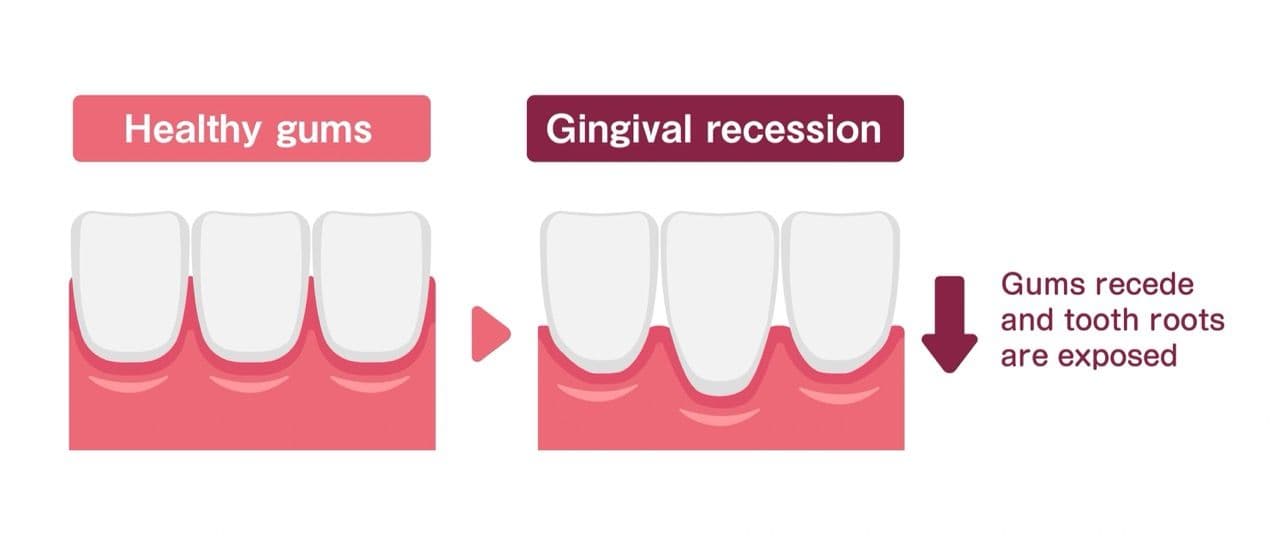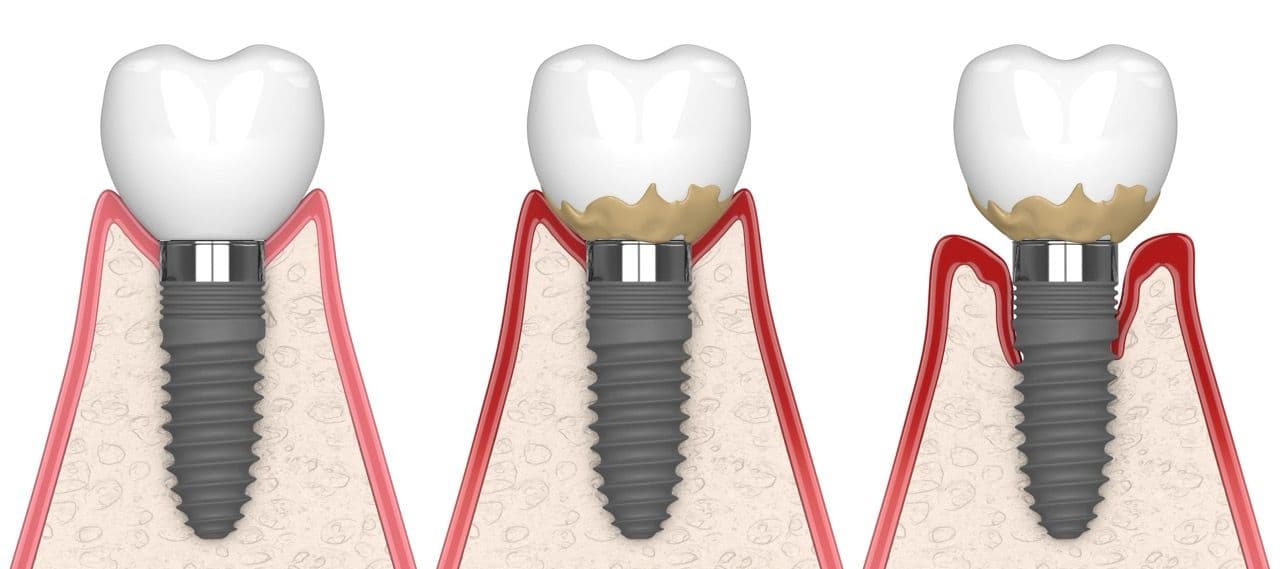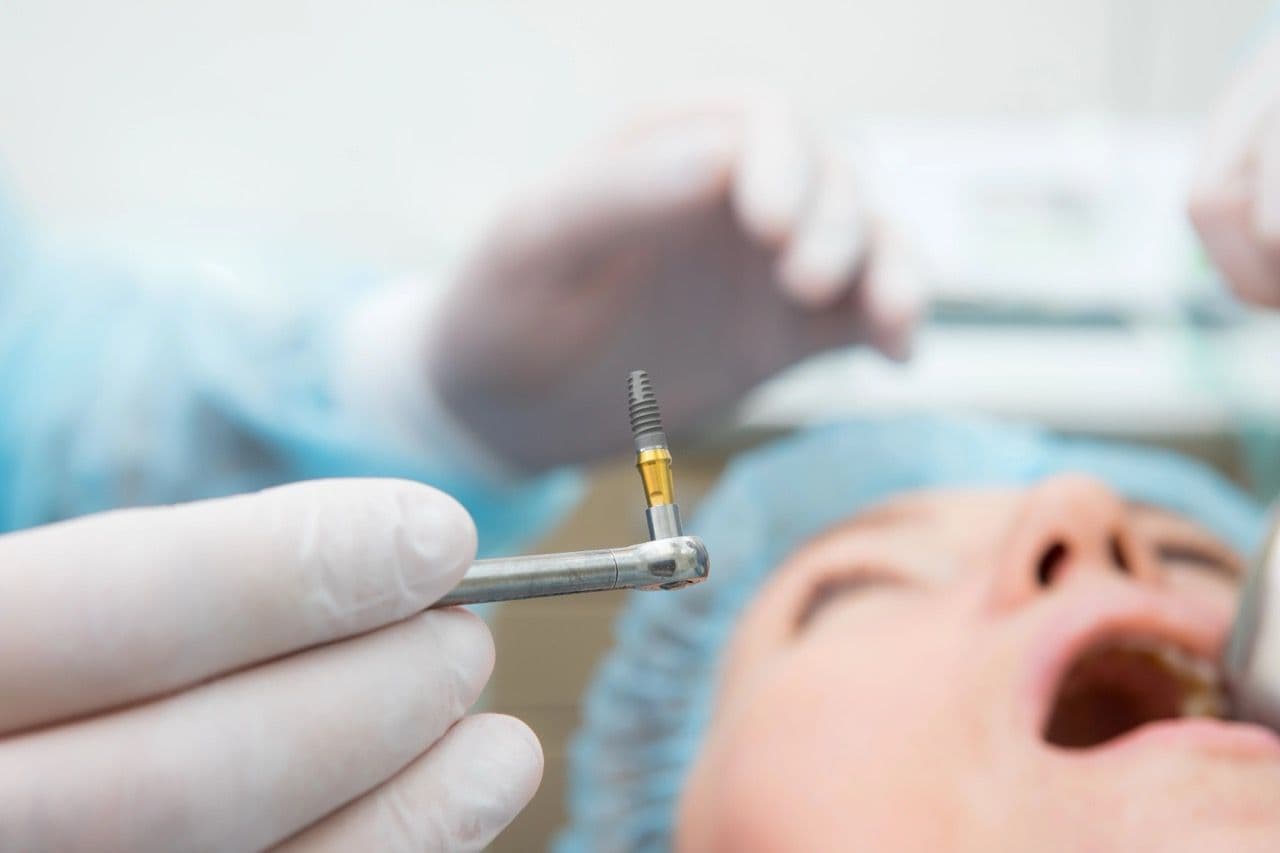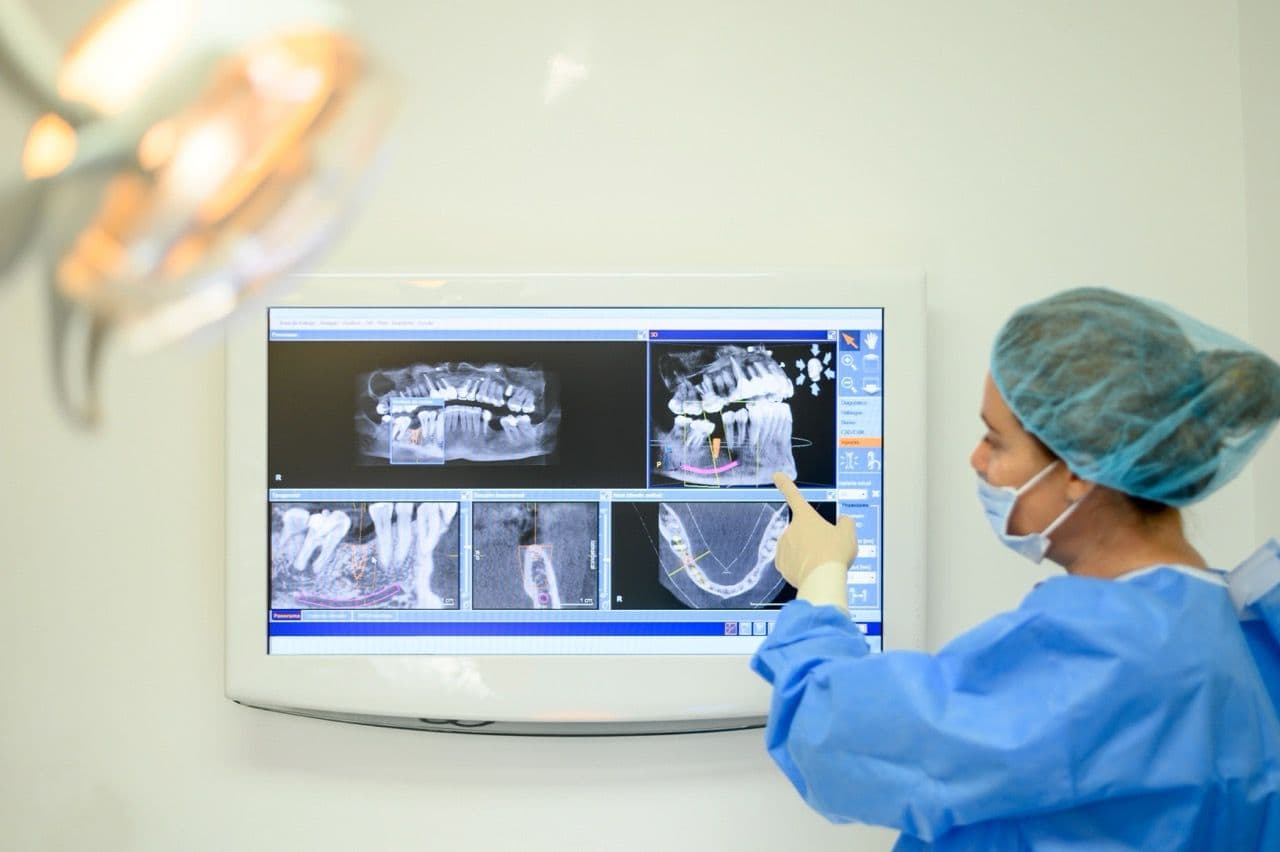While dental implants are very safe overall, it’s important to know the risks in advance so you can prevent them. Common short-term side effects include discomfort at the site, mild swelling or bruising, and slight bleeding.
More serious complications (though much less common) include infection, nerve injury, sinus problems, or implant failure. With careful planning and care, most side effects are mild and temporary.
Common Dental Implant Side Effects
In this guide, we’ll walk through common and rare issues and give you five steps to avoid them. By following these tips, from good oral hygiene to picking the right dentist, you can keep your new smile healthy and complication-free.
Discomfort & Pain
Mild pain or soreness around the implant site is normal for a few days after surgery. Your dentist will likely advise taking over-the-counter pain relievers (like ibuprofen) for the first 2–3 days. For most patients, this is enough to manage discomfort.
If pain is unusually severe or lasts more than a week, however, contact your dentist – persistent pain isn’t typical. In general, the initial tenderness fades as the jaw heals. Keeping your mouth clean and following all post-op instructions will help pain subside quickly.
Swelling & Bruising
It’s also normal to have some swelling and even light bruising of the gums and face after implant surgery. This inflammation usually peaks within 1–2 days and then begins to improve.
Applying an ice pack to the cheek during the first 24–48 hours every 20 minutes can help limit swelling. If swelling worsens after 2–3 days or is accompanied by severe redness or fever, see your dentist – those can be signs of infection. Otherwise, gentle icing and rest typically keep swelling to a minimum.
Minor Bleeding
A bit of bleeding or oozing right after the procedure is normal. You’ll probably be given gauze pads to bite on; change them if they soak through. Light red blood or pink-tinged saliva for a day or two is usually no concern.
If bleeding is heavy (soaking gauze continuously after 1–2 hours) or lasts beyond 2–3 days, call your dental office. In most cases, slight bleeding stops on its own, but you should be prepared to rest with your head elevated and apply gentle pressure with gauze or a tea bag. The tannins in tea can help stop bleeding. Our Understanding Gum Health After Implant Surgery post has more information on caring for your gums during healing.

Gingival Recession
In rare cases, the gum tissue around an implant can begin to recede. When gums pull back, it may expose more of the implant or make the area sensitive or prone to inflammation. Be very gentle when brushing near the implant for the first week, then resume normal but careful brushing and flossing.
Maintaining excellent hygiene helps keep gums healthy so they bond well to the implant. If you notice gingival recession, contact your dentist. Gum grafting procedures can also often restore lost gum tissue before the implant is compromised.

Less Common, More Serious Complications
While most people heal smoothly, implant surgery can occasionally lead to serious complications. These are less common, but it’s wise to understand and prevent them.
Infection & Peri-implantitis
Infection at the implant site is the most common serious complication. Bacteria can enter around the implant if the socket isn’t clean, leading to redness, swelling, pus, or pain. If not treated, this may progress to peri-implantitis, a form of gum disease around implants that can erode bone.
Signs like bad breath, swollen gums, or pus are red flags. If you see any of these signs, call your dentist. After getting dental implants, you’ll need to follow strict oral hygiene (brushing, flossing, rinses). Avoiding smoking and managing conditions like diabetes also lowers infection risk.
Nerve Damage
Because implants are placed near nerves in the jaw, there is a small risk of nerve injury. In practice, careful surgical planning (using 3D imaging) and experienced technique make this very rare. If a nerve is nicked, you might feel numbness or a “pins and needles” tingling in your tongue, chin or lips.
Most mild nerve discomfort improves in days to weeks. Persistent numbness should prompt an immediate dental visit. If sensation loss continues, an oral surgeon may need to intervene. In short, picking an implant dentist who uses precise placement techniques and has good anatomical knowledge is key to avoiding nerve injury.
Sinus Problems
Implants in the upper jaw come close to the sinus cavities. Upper-jaw implants can protrude into one of your sinus cavities, causing sinus irritation, congestion, or headaches. To prevent this, dentists will evaluate sinus anatomy (often with a CT scan) and may perform a sinus lift or use shorter implants if needed. Symptoms of a sinus issue after implant surgery, like congestion or clear nasal drainage when it wasn’t there before, should be checked promptly by your doctor.
Implant Failure
If an implant doesn’t bond properly with the bone (osseointegrate) or is overloaded, it can fail. Causes of failure include poor initial stability, infection (peri-implantitis), or habits like grinding teeth. For example, not enough bone density can prevent fusion, and untreated gum disease can destroy supporting bone.
To prevent failure, your dentist may do a bone graft if needed and will ensure the implant is well secured. (See the 5-Step section below for bone-health tips.) If an implant does loosen, early detection is crucial so it can be replaced before more bone is lost.
Allergic Reactions
Allergic responses to implant materials are extremely rare, but possible. Side effects of dental implants with titanium are not unheard of. Titanium is very biocompatible, but tiny impurities or patient sensitivities can cause local reactions (redness, swelling, rash) in a few cases.
If you know you have metal allergies (to titanium or other metals), tell your dentist. There are alternative materials available, with another popular option being zirconia dental implants. Again, this is uncommon and most patients tolerate standard implants with no immune issues.

What Causes the Side Effects of Dental Implants?
Most side effects stem from a few common factors: patient health, surgical technique, and oral hygiene. For instance, people who smoke or have uncontrolled diabetes or gum disease face a higher risk of implant complications. Implant success, which studies show is around 90%, is lower in smokers, diabetics, or those with bone/health issues. That’s because smoking cuts blood flow and healing, and diabetes makes infections harder to fight.
The dentist’s skill and planning also matter. If an implant is placed incorrectly (at the wrong angle or depth), it may damage surrounding tissue or fail to integrate. The implant site itself must be healthy. Placing an implant into weak or infected bone will likely lead to problems.
Untreated periodontal disease (gum disease) can compromise the bone around an implant, causing inflammation or failure. In short, side effects often arise when risk factors are overlooked, so addressing any health or dental issues before treatment is key. For more on how failures happen, see our blog: A Dentist Explains the Causes of Dental Implant Failure.
5-Step How-To: Prevent Side Effects
Preventing complications starts with good habits before and after surgery. Keeping implants and gums clean through professional teeth cleanings and diligent brushing around the implant will clear the plaque that can cause infection.
Step 1: Choose the right dental team
Make sure your dentist or oral surgeon is experienced with implants. They should perform a full dental exam (including X-rays or 3D scans) before the procedure. A skilled provider will plan the ideal implant size and position for your mouth, minimizing risks to nerves or sinuses. Don’t hesitate to ask about your doctor’s implant training or before-and-after results. Proper planning is the first line of defense against any issues.
Step 2: Optimize your health and habits
In the weeks leading up to surgery, follow any pre-op instructions. If you smoke, quit well in advance – smoking significantly slows healing and increases failure risk. Control any chronic conditions. For example, people with diabetes should keep blood sugar in range, and anyone with gum disease should have it treated first. Discuss all your medications with your dentist.
Step 3: Follow all post-op care instructions
Right after your implant is placed, take care of yourself. Rest with your head elevated, and use ice packs intermittently (20 minutes on, 20 off) to reduce swelling. Your dentist will likely advise a soft food diet for the first few days. Avoid hot, hard, or crunchy foods that might irritate the site. Take prescribed painkillers and any antibiotics exactly as directed. Do not smoke or use straws (the suction can disturb healing). Small measures like these, often outlined in your aftercare sheet, help your tissues heal smoothly.
Step 4: Maintain rigorous oral hygiene
Once the first 24 hours have passed, clean around the implant. Brush twice daily with a soft-bristled brush, and floss gently or use an oral irrigator to remove debris around the implant. Consider antibacterial mouthwash if your dentist suggests it. Regularly schedule professional cleanings so your dental hygienist can remove any hard plaque. Scaling may be needed periodically to keep the gums healthy. Good hygiene prevents peri-implantitis and infection, the top threats to implant stability.
Step 5: Wear a night guard and attend follow-ups
If you grind your teeth, ask for a custom night guard to protect the new implant. Also, keep your scheduled follow-up appointments. Your dentist will check the healing progress and adjust your care as needed. Over time, avoid habits like chewing ice or hard candy that can stress the implant.

Recognizing When to Seek Help
Even with prevention, you should stay vigilant during healing. Contact your dentist promptly if you notice:
- Signs of infection. Symptoms like bad breath that won’t go away, swollen or reddened gums, persistent pus, or fever. Any unusual discharge or a bad taste should be evaluated.
- Excessive pain or swelling. It’s normal to have mild pain and swelling for a few days, but if pain worsens instead of improving, or if swelling increases after day 2, get help.
- Numbness or tingling. Minor numbness immediately after surgery can occur, but if numbness or tingling in the lips, tongue or chin persists beyond a few days, it may indicate nerve irritation. Seek care if this happens.
- Loose or shifting implant. If you feel any movement of the implant or sudden loss of stability when chewing, contact your dentist at once. An implant should be firmly anchored. Loosening means it may not be integrating properly.
- Receding gums or unusual tissue changes. If you notice your gum line pulling away from the implant or white/red patches around the site, mention this at your dental visit. It could signal tissue irritation.
If discomfort gets worse in the days after surgery, contact your surgeon. Early intervention is the best way to prevent a minor issue from becoming a major complication.
Prevent Dental Implant Side Effects with Affordable Dentures & Implants
By understanding potential side effects of dental implants, you can take simple steps to prevent them. Remember the 5 key strategies above: screen your health and provider, follow care instructions, and keep the implant area impeccably clean. Many patients worry about problems that never occur, but it’s always best to be cautious. If you notice any warning sign (pain, redness, loose implant), get help quickly to address it.
Affordable Dentures & Implants is here to make sure your implant experience is as smooth as possible. Our doctors plan every case carefully to avoid complications, and we’ll guide you through healing with detailed instructions. If you have questions or concerns about implants, we encourage you to schedule a consultation with your local Affordable Dentures office. We’ll review your dental history and answer any questions so you can smile with confidence for years to come.
Sources:
https://www.medicalnewstoday.com/articles/dental-implants-problems#long-term-issues
https://pmc.ncbi.nlm.nih.gov/articles/PMC4944726/
![[object Object]](/_next/image?url=https%3A%2F%2Fcdn.sanity.io%2Fimages%2Fw75voqed%2Fproduction%2Fc20175fa656eab81026fbc9ef24b8b9d9d91ecc7-6800x5100.jpg&w=3840&q=75)
